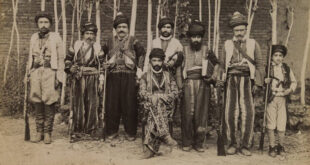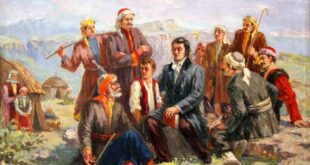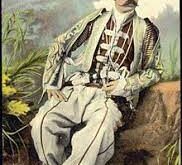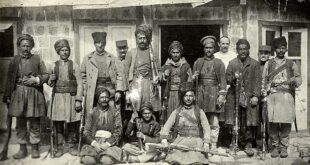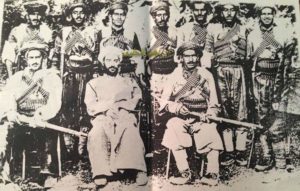
The glimpse of information from Russian, Ottoman Turkish, and British government sources from early 20th century give us a different look and appreciation the role of Sheikh Abdulsalam Barzani in Kurdistan liberation movements’ history in multiple aspects. The available sources indicate he had a great role across Kurdistan in early 1900s. Firstly, he has played a significant role in Kurdish national movement “IRSHAD” (Rightly guided). Secondly, he had good relation with Christian minorities in Kurdistan and was protecting them. Thirdly, perhaps he was among first Kurdish leaders to refuse Ottoman Turkish government religious and political supremacy in Kurdistan at that time.
The IRSHAD movement was largely organized in Ottoman Kurdistan had good relation and influence in Eastern (Iranian) Kurdistan via Smko Aga. For those who are not familiar with modern Middle East history the Ottoman Kurdistan until World War One covered North (Turkey), south (Iraq), and Western – Rojava (Syrian) parts of Kurdistan. According to Dr. Celile Celil based on Russian documents the IRSHAD was organized in most major Kurdish cities like, Erzurum, Van, Diyarbakir, Urfa, Musul, Bitlis, and some other cities. Organization was founded in May 1912. It is goal was to create and independent Kurdistan with support of Russia [1].
Some times in 1913 the IRSHAD hold a meeting in Sirvan (Sherwan) a sub district of Siirt. In this meeting organization decide to send a committee under leadership of Sheikh Abudulselam Barzani to Tiflis (It was under Russian control) for meeting with Russians officials. According to Dr. Suat Akgül the committee is referred as “Sheikh Abdulsalam Committee [3]” The multiple sources reports that Abdulsalam had very good relation with Smko Aga distinguish Kurdish leader in Eastern (Iranian) Kurdistan which largely was under Russian control.
The role of Sheikh Abdulsalam was very well observed by the British as well. The British Officials in Kurdish city of Van, Lt. I.M. Smith, HM Vice-Consul in March 13, 1914 in a dispatch to British Ambassador in Istanbul: “Reports that an Official military expedition was being organized against the Sheikh of Barzan and his followers. Discusses the position of the Sheikh as “one of the five or six most influential Kurdish Sheikhs”, notes the Ottoman administration feared his links to other Kurdish leaders, and had only a slight authority in this region [4].”
In regards to local conflicts Sheikh Abdulsalam relations with Christian minorities is well known and well documented. In May 21, 1913 the British Consul in Mosul sends the following statement to his government: “… the Sheikh of Barzan, true to his policy of protecting the Christians had recaptured the sheep and sent word to the men of Thkuma to come and fetch them. [5]” This is just one among many other example about Sheikh Abdulsalam tolerance and understanding, cooperation, and protection of minorities in Kurdistan.
The studies shows Sheikh Abdulsalam had a great vision for Kurdistan independence and had great relations across Kurdistan. He could see that Ottoman/Turkish regime is no longer sustainable particularly after military coups d’état of “Young Turks”. For example the British officials based on a Russian Official Newspaper “KAVKAS” from April 15/28 1914 on Kurdish movement on regards to Sheikh Abdul Selam Barzani states: “After the deposition of Abdul Hamid, Barzan, and with his whole community, would not recognize the new Caliph Mahomet V, not the young Turkish administration,..[6] “ It is important to know that Young Turk removed Sultan Abdul Hamid from power in 1909 [7] This is perhaps an indication that Sheikh Abdulsalam Barzani was convinced the Ottoman empire will collapse under new regime five years before World War One and 14 years before empire officially dissolved and ended.
In short, one could see the foresight of Sheikh Abdulsalam and great role he played in Kurdish movement across Kurdistan. He had extensive diplomatic and political relations with all major powers of the time. This is an important subject for further study for a better understanding of Kurdish national movement and earlier international relations.
[1] The word “Sheikh” in Kurdish means Spiritual guide and/or Spiritual leader and it is different from it is Arabic origin. It is often wrongly translated as tribal leader.[2] Celil, Celile. “ XIX. Yuzyil Osmanli Imparatorlugu’ nda Kurtler P. 202 (Translated from Russian to Turkish by Demir,
Mehmet” Ozge yayinlari February 1992 Ankara/Turkey
[3] Akgül, Suat “Rusya’nın Doğu Anadolu Politikası” (Ph.D. diss., Hacettepe Üniversitesi, 1995), P. 78
[Russian Policy on Eastrn Anatolia (Till 1918)] [4] Dispatch, Lt. I.M. Smith, HM Vice-Consul, Van to Sir L. Mallet, HM Ambassador to Turkey, Constantinople, 13 March 1914, No. 5 [FO 195/2458] P. XXV] Records of the Kurds : territory, revolt and nationalism, 1831-1979. British documentary sources. Volume 4.
[5] Vice-Consul Hony to Sir G. Lowther (No. 15.) Mosul, May 21, 1913. Records of the Kurds : territory, revolt and nationalism, 1831-1979. British documentary sources. Volume 4 P. 559
[6] Enclosure in Consul Monahan’s No. 200f the 20thth. June 1914. ‘KAVKAS’ 15/28TH April 1914 Kurdish movement Records of the Kurds : territory, revolt and nationalism, 1831-1979. British documentary sources. Volume 4 P. 667
[7] “Abdülhamid II Ottoman sultan” Encyclopedia Britannica http://www.britannica.com/biography/Abdulhamid-II
 History of Kurdistan
History of Kurdistan
